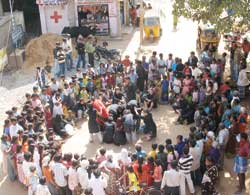World a stage

Theatre students perform a piece on the role of women in the impoverished neighbourhood of Rajendra Nagar.
photo by shiv raj
Many people say that art can change the world, but few artists end up travelling with lawyers to the other side of the globe to make that happen.
Theatre chair Ted Little founded the Theatre and Development program at Concordia nearly a decade ago. The program teaches students how to use theatre as a tool of social change and activism.
Little was approached by Mireille Deschênes, of the Equality Committee of the Quebec Bar Association, to develop a way that theatre and law students could work together. Little saw the potential of the collaboration to go beyond merely illustrating community problems and frustrations to actually using theatre to “explore existing structures and resources.”
Rights Here is a partnership involving Theatre and Development, Park Extension Youth Organization (PEYO), Deschênes and Montreal’s Teesri Duniya Theatre (Little is an associate artistic director).
Little set the project in motion last December by having partners experience both a different culture and the street theatre techniques and activism practiced at Christ Church College’s Centre for Social Action (CSA) in Bangalore. The CSA has been using street theatre in conjunction with their schools, nutrition programs and micro-financing projects.
Representatives of the Canadian partner organizations worked with Indian students from the CSA to create pieces related to local concerns about health care, water and sustainability. The pieces were performed in poor urban centres and rural communities around Bangalore. The Canadian students worked with the Indian students to develop works in what was billed as the Kannada/Canada project (Kannada is the ancestral language of the Indian state of Karnataka).
By seeking out this expertise, Little wanted to recast the traditional relationship of the developed and developing world. “I wanted a relationship built on partnership and certainly not on some idea of ‘Oh, those poor people, we have to help them.’”
Nisha Sajnani, who is working towards a PhD combining autobiographical performance and community economic development, was thrilled to participate in the trip, along with nearly two-dozen other students and professionals, including Little and Theatre professor Rachel Van Fossen.
This was Sajnani’s second trip to India. In one rural community, they performed a piece on access to clean water. When a local man confronted them on what they could do for his two children, who hadn’t had water in two days, “I realized we were talking about something very real, and we were not running the same risks that they were.”
The students used the presentation as a platform for the local branch of the CSA to talk about their water access program. “It really demonstrated the necessity of working in alliance. Much of politically motivated theatre stops at awareness-raising. We want the art form to be a platform for dialogue and concrete action,” Sajnani said.
The second stage of Rights Here involves training a team of Park Extension youth in street theatre techniques to articulate what they perceive to be community concerns. The pieces will be performed in community centres throughout Park Ex in June.
Given her experiences in Bangalore, Sajnani does not want to anticipate the issues local youth might raise, nor the results of those presentations.
“Theatre is one medium of advocating change, and accessing justice through legal channels is another.” It is hoped that Rights Here will be able to lead to concrete benefits in the community.
Little wants to bring the project to other communities. Park Ex was chosen because of its cultural diversity. The community has a large concentration of migrant and refugee residents, representing 80 different languages.